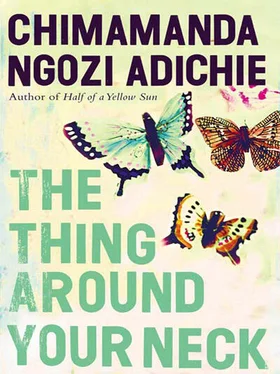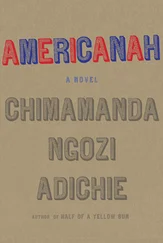Once, at a moonlight gathering, the square full of women telling stories and learning new dances, a group of girls saw Nwamgba and began to sing, their aggressive breasts pointing at her. She stopped and asked whether they would mind singing a little louder so that she could hear the words and then show them who was the greater of two tortoises. They stopped singing. She enjoyed their fear, the way they backed away from her, but it was then that she decided to find a wife for Obierika herself.
Nwamgba liked going to the Oyi stream, untying her wrapper from her waist and walking down the slope to the silvery rush of water that burst out from a rock. The waters of Oyi were fresher than those of the other stream, Ogalanya, or perhaps it was simply that she felt comforted by the shrine of the Oyi goddess, tucked away in a corner; as a child she had learned that Oyi was the protector of women, the reason women were not to be sold into slavery. Her closest friend, Ayaju, was already at the stream, and as Nwamgba helped her raise her pot to her head, she asked Ayaju who might be a good second wife for Obierika.
She and Ayaju had grown up together and married men from the same clan. The difference between them, though, was that Ayaju was of slave descent; her father had been brought as a slave after a war. Ayaju did not care for her husband, Okenwa, who she said resembled and smelled like a rat, but her marriage prospects had been limited; no man from a freeborn family would have come for her hand. Ayaju’s long-limbed, quick-moving body spoke of her many trading journeys; she had traveled even beyond Onicha. It was she who had first brought tales of the strange customs of the Igala and Edo traders, she who first told of the white-skinned men who arrived in Onicha with mirrors and fabrics and the biggest guns the people of those parts had ever seen. This cosmopolitanism earned her respect, and she was the only person of slave descent who talked loudly at the Women’s Council, the only person who had answers for everything.
And so she promptly suggested, for Obierika’s second wife, the young girl from the Okonkwo family; the girl had beautiful wide hips and was respectful, nothing like the young girls of today with their heads full of nonsense. As they walked home from the stream, Ayaju said that perhaps Nwamgba should do what other women in her situation did — take a lover and get pregnant in order to continue Obierika’s lineage. Nwamgba’s retort was sharp, because she did not like Ayaju’s tone, which suggested that Obierika was impotent, and as if in response to her thoughts she felt a furious stab in her back and knew that she was pregnant again, but she said nothing, because she knew, too, that she would lose the baby again.
Her miscarriage happened a few weeks later, lumpy blood running down her legs. Obierika comforted her and suggested they go to the famous oracle, Kisa, as soon as she was well enough for the half day’s journey. After the dibia had consulted the oracle, Nwamgba cringed at the thought of sacrificing a whole cow; Obierika certainly had greedy ancestors. But they did the ritual cleansings and the sacrifices, and when she suggested he go and see the Okonkwo family about their daughter, he delayed and delayed until another sharp pain spliced her back; and months later, she was lying on a pile of freshly washed banana leaves behind her hut, straining and pushing until the baby slipped out.
They named him Anikwenwa: the earth god Ani had finally granted a child. He was dark and solidly built and had Obierika’s happy curiosity. Obierika took him to pick medicinal herbs, to collect clay for Nwamgba’s pottery, to twist yam vines at the farm. Obierika’s cousins Okafo and Okoye visited too often. They marveled at how well Anikwenwa played the flute, how quickly he was learning poetry and wrestling moves from his father, but Nwamgba saw the glowing malevolence that their smiles could not hide. She feared for her child and her husband, and when Obierika died — a man who had been hearty and laughing and drinking palm wine moments before he slumped — she knew that they had killed him with medicine. She clung to his corpse until a neighbor slapped her to make her let go; she lay in the cold ash for days; she tore at the patterns shaved into her hair. Obierika’s death left her with an unending despair. She thought often of the woman who, after her tenth successive child died, had gone to her backyard and hanged herself on a kola tree. But she would not do it, because of Anikwenwa.
Later, she wished she had insisted that his cousins drink Obierika’s mmili ozu before the oracle. She had witnessed this once, when a wealthy man died and his family insisted his rival drink his mmili ozu . Nwamgba had watched the unmarried woman take a cupped leaf full of water, touch it to the dead man’s body, all the time speaking solemnly, and give the leafcup to the accused man. He drank. Everyone watched to make sure he swallowed, a grave silence in the air because they knew that if he was guilty he would die. He died days later, and his family lowered their heads in shame and Nwamgba felt strangely shaken by it all. She should have insisted on this with Obierika’s cousins, but she had been blinded by grief and now Obierika was buried and it was too late.
His cousins, during the funeral, took his ivory tusk, claiming that the trappings of titles went to brothers and not to sons. It was when they emptied his barn of yams and led away the adult goats in his pen that she confronted them, shouting, and when they brushed her aside, she waited until evening and then walked around the clan singing about their wickedness, the abominations they were heaping on the land by cheating a widow, until the elders asked them to leave her alone. She complained to the Women’s Council, and twenty women went at night to Okafo and Okoye’s home, brandishing pestles, warning them to leave Nwamgba alone. Members of Obierika’s age grade, too, told them to leave her alone. But Nwamgba knew those grasping cousins would never really stop. She dreamed of killing them. She certainly could — those weaklings who had spent their lives scrounging off Obierika instead of working — but of course she would be banished and there would be nobody to care for her son. So she took Anikwenwa on long walks, telling him that the land from that palm tree to that plantain tree was theirs, that his grandfather had passed it on to his father. She told him the same things over and over, even though he looked bored and bewildered, and she did not let him go and play at moonlight unless she was watching.
Ayaju came back from a trading journey with another story: the women in Onicha were complaining about the white men. They had welcomed the white men’s trading station, but now the white men wanted to tell them how to trade, and when the elders of Agueke, a clan of Onicha, refused to place their thumbs on a paper, the white men came at night with their normal-men helpers and razed the village. There was nothing left. Nwamgba did not understand. What sort of guns did these white men have? Ayaju laughed and said their guns were nothing like the rusty thing her own husband owned. Some white men were visiting different clans, asking parents to send their children to school, and she had decided to send Azuka, the son who was laziest on the farm, because although she was respected and wealthy, she was still of slave descent, her sons still barred from taking titles. She wanted Azuka to learn the ways of these foreigners, since people ruled over others not because they were better people but because they had better guns; after all, her own father would not have been brought as a slave if his clan had been as well armed as Nwamgba’s clan. As Nwamgba listened to her friend, she dreamed of killing Obierika’s cousins with the white men’s guns.
Читать дальше











